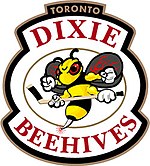
The Ontario Junior Hockey League (OJHL) is a Junior A ice hockey league in Ontario, Canada. It is under the supervision of the Ontario Hockey Association (OHA) and the Canadian Junior Hockey League (CJHL).
The Metro Junior "A" Hockey League was a junior level ice hockey league based out of Southern Ontario. The league originated in 1956 as the Metro Junior "B" Hockey League, which lasted until 1991, when it changed its designation from Junior B to Junior A. It remained a Jr. A league from 1991 until 1998 when it was absorbed by the Ontario Provincial Junior A Hockey League.

The Kingston Voyageurs were a Junior "A" ice hockey team from Kingston, Ontario, Canada. They were a part of the Ontario Junior A Hockey League.

The Newmarket Hurricanes were a Junior "A" ice hockey team from Newmarket, Ontario. They played in the Ontario Junior Hockey League. The franchise existed from 1972 until 2019, based in Newmarket starting in 1975.

The Toronto Jr. Canadiens are a Junior "A" ice hockey team based in the Downsview neighbourhood of Toronto, Ontario, Canada. They were known as the Wexford Raiders until the end of the 2005–06 season and are a part of Ontario Junior Hockey League (OJHL) but used to be a part of the Metro Junior A Hockey League.

Dixie Beehives are a pair of defunct junior ice hockey teams from Weston, Ontario, Canada, which is now part of Toronto, Ontario. They played in the Ontario Provincial Junior A Hockey League and the Central Junior B Hockey League.
The Weston Dodgers are a defunct Tier II Junior "A" ice hockey team from Weston, Ontario, Canada. They were a part of the Ontario Provincial Junior A Hockey League. The franchise was previously known as the Woodbridge Dodgers from 1953 to 1962, and became the Weston Dodgers after that.

The Caledon Admirals are a Junior 'A' ice hockey team based in Caledon, Ontario, Canada. They are a part of the Ontario Junior Hockey League.

The Ontario Provincial Junior A Hockey League (OPJHL) was a Canadian Junior ice hockey league based in Ontario and sanctioned by the Ontario Hockey Association and the Canadian Amateur Hockey Association. The league operated from 1972 until 1987. This league was the forerunner to the current Ontario Provincial Junior A Hockey League that was promoted in 1993. From 1972 until 1977, the OPJHL shared their region with the Southern Ontario Junior A Hockey League.
The 2007–08 OPJHL season is the 15th season of the Ontario Provincial Junior A Hockey League (OPJHL). The thirty-five teams of the North, South, East, and West divisions will compete in a 49-game schedule.
The 2005–06 OPJHL season is the 13th season of the Ontario Provincial Junior A Hockey League (OPJHL). The thirty-six teams of the North, South, East, and West divisions will compete in a 49-game schedule.
The 2001–02 OPJHL season is the ninth season of the Ontario Provincial Junior A Hockey League (OPJHL). The thirty-six teams of the North, South, East, and West divisions competed in a 49-game schedule.
The 1999–2000 OPJHL season is the seventh season of the Ontario Provincial Junior A Hockey League (OPJHL). The thirty-five teams of the North, South, East, and West divisions competed in a 49-game schedule.
The 1998–99 OPJHL season is the sixth season of the Ontario Provincial Junior A Hockey League (OPJHL). The thirty-seven teams of the Central, East, and West divisions competed in a 51-game schedule. The top eight of each division made the Buckland Cup playoffs.
The 1996–97 OPJHL season is the fourth season of the Ontario Provincial Junior A Hockey League (OPJHL). The twenty-two teams of the MacKenzie, MacKinnon, Phillips, and Ruddock Divisions competed in a 51-game schedule. The top 4 teams of each division make the playoffs.
The 1995–96 OPJHL season is the third season of the Ontario Provincial Junior A Hockey League (OPJHL). The twenty-two teams of the MacKenzie, MacKinnon, Phillips, and Ruddock Divisions competed in a 50-game schedule. The top 4 teams of each division make the playoffs.
The 1995–96 MetJHL season is the 5th season of the Metro Junior A Hockey League (MetJHL). The 12 teams of the Eastern and Western Divisions competed in a 52-game schedule. The top 4 teams in each division made the playoffs.

The 2009–10 CCHL season was the first and only season of the Central Canadian Hockey League (CCHL). The 21 teams of the East and West Divisions competed in 50 regular season games, with the top eight teams in each division competing in the playoffs for the league championship.
The 1993–94 MetJHL season is the 3rd season of the Metro Junior A Hockey League (MetJHL). The 14 teams of the Fullan and Bauer Divisions competed in a 50-game schedule. The top 4 teams in each division made the playoffs.
The 1991–92 MetJHL season is the 1st season of the Metro Junior A Hockey League (MetJHL). The 12 teams of the Fullan and Bauer Divisions competed in a 44-game schedule. The top 6 teams in each division made the playoffs.









